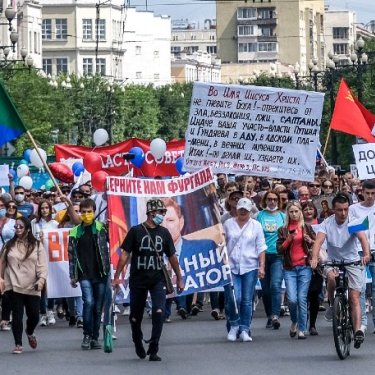Crackdown on journalists intensifying in Russia’s far east

Reporters Without Borders (RSF) condemns a growing crackdown on journalists covering a nearly five-month-old wave of protests in Khabarovsk, in Russia’s far east, and calls for independent investigations into the abuses to which media personnel are being subjected there.
Читать на русском / Read in Russian
Independent and opposition media are now being singled out by the authorities in their efforts to curb demonstrations for the release of the Khabarovsk region’s former governor, Sergey Furgal, who was arrested in July and then stripped of his position.
The victims of persecution include Tatiana Khlyestunova, the correspondent of the Belogorsk regional newspaper Prosto Gazeta, who was re-arrested on Tuesday on her release from prison, where she had been serving a four-day sentence for allegedly participating in an illegal demonstration, and has been sentenced again to ten days in prison today.
Arrest merry-go-round
Andrey Solomakhin, a reporter for the Newsader news agency, is another victim. After being throttled with a baton, paralyzed with a taser and denied food and water for 24 hours, he was fined 10,000 roubles (110 euros) at the end of an 11-hour trial on 6 November. Then he was sentenced to six days in prison on 9 November, and finally another seven days while still held – all this despite having been hospitalized with concussion and multiple injuries.
At least three other journalists have experienced this arrest merry-go-round. Dmitri Khetagurov, who works for the online media Sotavision, Boris Zhirnov, a reporter for the human rights weekly Arsenievskiye Vesti, and Ekaterina Biyak, who reports for the RusNews and Activatica news websites, were arrested while covering a protest on 12 November and were given jail sentences for participating in an illegal demonstration. Then they were re-arrested as they left prison. The second two were also fined 10,000 roubles.
Spied on by the authorities
Other journalists have been arbitrarily arrested in the street. They include Dmitri Timoshenko, a reporter for RusNews and Newsader, who has already been given three jail sentences, and his colleague Aleksey Filimonov, who was fingerprinted at a police state and given two heavy fines.
After covering a demonstration on 15 October, Sergey Plotnikov of RusNews was abducted, tortured and threatened by men wearing green hoods like those used by the special services. Since then, he says he has been permanently followed by two officials from Khabarovsk’s Centre for Combatting Extremism (an interior ministry offshoot), even in Moscow and Saint Petersburg. After being arrested and fined, Sotavision’s Ekaterina Ishchenko was harassed on social media.
“This apparently coordinated crackdown on the local media must definitely stop,” said Jeanne Cavelier, the head of RSF’s Eastern Europe and Central Asia desk. “We call on Khabarovsk acting governor Mikhail Degtyarev to release Tatiana Khlyestunova and to respect Russia’s international obligations with regard to press freedom. We also ask the federal authorities to conduct an independent investigation into the arbitrary arrests of journalists and into the violence to which Sergey Plotnikov was subjected.”
The Kremlin’s arbitrary appointment of Degtyarev to replace Furgal, who was elected with 70% of the vote, and the systematic arrests of journalists in the Khabarovsk region have parallels with the crackdown on the media in Belarus. Expressions of reciprocal solidarity have been seen at demonstrations.
Russia is ranked 149th out of 180 countries in RSF's 2020 World Press Freedom Index.



